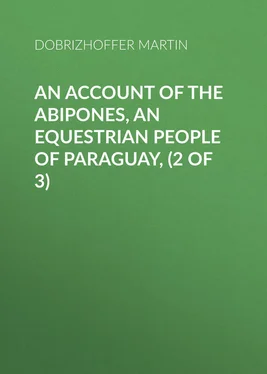Martin Dobrizhoffer - An Account of the Abipones, an Equestrian People of Paraguay, (2 of 3)
Здесь есть возможность читать онлайн «Martin Dobrizhoffer - An Account of the Abipones, an Equestrian People of Paraguay, (2 of 3)» — ознакомительный отрывок электронной книги совершенно бесплатно, а после прочтения отрывка купить полную версию. В некоторых случаях можно слушать аудио, скачать через торрент в формате fb2 и присутствует краткое содержание. Жанр: foreign_antique, foreign_prose, на английском языке. Описание произведения, (предисловие) а так же отзывы посетителей доступны на портале библиотеки ЛибКат.
- Название:An Account of the Abipones, an Equestrian People of Paraguay, (2 of 3)
- Автор:
- Жанр:
- Год:неизвестен
- ISBN:нет данных
- Рейтинг книги:3 / 5. Голосов: 1
-
Избранное:Добавить в избранное
- Отзывы:
-
Ваша оценка:
- 60
- 1
- 2
- 3
- 4
- 5
An Account of the Abipones, an Equestrian People of Paraguay, (2 of 3): краткое содержание, описание и аннотация
Предлагаем к чтению аннотацию, описание, краткое содержание или предисловие (зависит от того, что написал сам автор книги «An Account of the Abipones, an Equestrian People of Paraguay, (2 of 3)»). Если вы не нашли необходимую информацию о книге — напишите в комментариях, мы постараемся отыскать её.
An Account of the Abipones, an Equestrian People of Paraguay, (2 of 3) — читать онлайн ознакомительный отрывок
Ниже представлен текст книги, разбитый по страницам. Система сохранения места последней прочитанной страницы, позволяет с удобством читать онлайн бесплатно книгу «An Account of the Abipones, an Equestrian People of Paraguay, (2 of 3)», без необходимости каждый раз заново искать на чём Вы остановились. Поставьте закладку, и сможете в любой момент перейти на страницу, на которой закончили чтение.
Интервал:
Закладка:
You cannot imagine in what dark colours the Europeans, who first entered these provinces, described the stupidity of the Americans. Brother Thomas Ortiz, afterwards Bishop of Sta. Martha, intimates in his letters to the Court of Madrid, that the Americans are foolish, dull, stupid, and unreasoning like beasts, that they are incapable of understanding the heads of religion, and devoid of human sense and judgement. Some of the Spaniards thought the Americans so stupid, that they wished to exclude them, even after they were grown up, from baptism, confession, and other sacraments, as being in the condition of infants who are not yet possessed of reason. Paul the Third was obliged to issue a bull, in the year 1537, the second of June, by which he pronounced the Indians to be really men, and capable of understanding the Catholic faith, and receiving the sacraments, the cause of the Indians being pleaded by Bartolomeo De las Casas, afterwards Bishop of Chiapa. The pontifical decree begins Vetitas ipsa , and is extant in Harold. Notwithstanding this, "the adult Indians in Peru, who have been baptized and properly confessed, do not partake of the divine communion once every year, nor indeed when on the point of death," as Acosta says in the eighth chapter of his work: De procuranda Indorum Salute . Nor did the exhortations and comminations of the famous councils at Lima procure the Indians permission to partake of the eucharist, as appears from the complaints and decrees of the synods held in the next century at Lima, Plata, Arequipa, Paza, and Paraguay. For the priests, who denied the eucharist, always alleged the stupidity, ignorance, and inveterate wickedness of the Indians in their excuse. But the synod held at Paza in the year 1638, was of opinion that this ignorance of the Indians should be ascribed to the negligence of their pastors, by whose sedulous instruction these wretches might have emerged from the native darkness of their minds, and from the slough of wickedness.
Taught by the experience of eighteen years spent amongst the Guaranies, and Abipones, I profess to hold the same opinion, having myself seen most barbarous savages born in the woods, accustomed from their earliest age to superstition, slaughter, and rapine, and naturally dull and stupid as brutes, who, after their removal to the colonies of the Jesuits, by daily instruction and by the example of old converts, became well acquainted with and attached to the divine law. Although the Americans are but slow of understanding, yet when the good sense of the teacher compensates for the stupidity of his pupils, they are successfully converted to civilization and piety, and even instructed in arts of all kinds. If you wish to see, with your own eyes, to what a degree instruction sharpens the wits of the Indians, and enlarges their comprehensions, go and visit the Guarany towns; in all of which you will find Indians well skilled in the making and handling of musical instruments, in painting, sculpture, cabinet-making, working metals of every kind, weaving, architecture, and writing; and some who can construct clocks, bells, gold clasps, &c. according to all the rules of art. Moreover, there were many who printed books, even of a large size, not only in their native tongue, but in the Latin language, with brass types, which they made themselves. They also write books with a pen so artfully, that the most discerning European would swear they were printed. The Bishops, Governours, and other visitants, were astonished at the workmanship of the Indians, which they saw or heard of in the Guarany towns. The Guaranies were instructed in music, and other arts, by the Jesuit Missionaries, Italians, Flemings, and Germans, who found the Indians docile beyond their expectation. Of this, however, I am perfectly certain, that the Indians comprehend what they see sooner and more easily than what they hear, like the rest of mankind, who are all more readily instructed by the eyes than by the ears. If you desire a Guarany to paint or engrave any thing, place a copy before his eyes, and he will imitate it and execute his task with accuracy and elegance. If a pattern be wanting, and the Indian be left to his own devices, he will produce nothing but stupid bungling work, though you may have endeavoured to explain your wishes to him as fully as possible. Neither should you imagine that the Americans are deficient in memory. It was an old custom in the Guarany Reductions to make the chief Indian of the town, or one of the magistrates, repeat the sermon just delivered from the pulpit before the people in the street, or in the court-yard of our house; and they almost all did it with the utmost fidelity, without missing a sentence. Any piece of music which they have either sung or played on the flute, or organ, two or three times from note, becomes so infixed in their memory, that if the music paper were carried away by the wind, they would have no further occasion for it. From these things a theologian will infer that the thinking powers of the Abipones are not circumscribed by such narrow limits as to render them incapable of knowing, or at least suspecting the existence of a God, the creator and governour of all things, from the sight of the things created. The nation of the Guaranies, though formerly very ferocious, knew the supreme Deity, whom they call Tupâ , a word composed of two particles, tû , a word of admiration, and pà , of interrogation.
I said that the Abipones were commendable for their wit and strength of mind; but, ashamed of my too hasty praise, I retract my words, and pronounce them fools, idiots, and madmen. Lo! this is the proof of their insanity! They are unacquainted with God, and with the very name of God, yet affectionately salute the evil spirit, whom they call Aharaigichi , or Queevèt , with the title of grandfather, Groaperikie . Him they declare to be their grandfather, and that of the Spaniards, but with this difference, that to the latter he gives gold and silver, and fine clothes, but that to them he transmits valour; for they account themselves more courageous and intrepid than any of the Spaniards. Should you ask them what their grandfather formerly was, and of what condition, they will confess themselves utterly ignorant on the subject. If you persist in your interrogations, they will declare this grandfather of theirs to have been an Indian – so barren and absurd is their theology. The Abipones think the Pleiades to be the representation of their grandfather; and as that constellation disappears at certain periods from the sky of South America, upon such occasions, they suppose that their grandfather is sick, and are under a yearly apprehension that he is going to die: but as soon as those seven stars are again visible in the month of May, they welcome their grandfather, as if returned and restored from sickness, with joyful shouts, and the festive sound of pipes and trumpets, congratulating him on the recovery of his health. Quemen naachic latenc! layàm nauichi enà? Ta yegàm! Layamini! What thanks do we owe thee! and art thou returned at last? Ah! thou hast happily recovered! – With such exclamations, expressive of their joy and their folly, do they fill the air. Next day they all go out to seek honey to make mead, and, as soon as that is prepared, they assemble in one place, at the setting of the sun, to make public demonstration of gladness. They pass the night, the married Abipones sitting on the ground on skins, the by-standing women singing with a loud voice, and the crowd of single persons laughing and applauding, by the light of torches, which shine here and there about the market-place. Some female juggler, who conducts the festive ceremonies, dances at intervals, rattling a gourd full of hardish fruit-seeds to musical time, and, whirling round to the right with one foot, and to the left with another, without ever removing from one spot, or in the least varying her motions. This foolish crazy dance is interrupted every now and then by the horrid clangor of military trumpets, in which the spectators join, making a loud noise by striking their lips with their hands. Yet in the midst of all this you can never perceive the smallest deviation from strict decorum. The men are decently separated from the women; the boys from the girls. The female dancer, the priestess of these ridiculous ceremonies, as a mark of particular favour, rubs the thighs of some of the men with her gourds, and, in the name of their grandfather, promises them swiftness in pursuing enemies and wild beasts. At the same time the new male and female jugglers, who are thought equal to the office, are initiated with many ceremonies. Of this most mischievous description of men I am now going to treat more fully.
Читать дальшеИнтервал:
Закладка:
Похожие книги на «An Account of the Abipones, an Equestrian People of Paraguay, (2 of 3)»
Представляем Вашему вниманию похожие книги на «An Account of the Abipones, an Equestrian People of Paraguay, (2 of 3)» списком для выбора. Мы отобрали схожую по названию и смыслу литературу в надежде предоставить читателям больше вариантов отыскать новые, интересные, ещё непрочитанные произведения.
Обсуждение, отзывы о книге «An Account of the Abipones, an Equestrian People of Paraguay, (2 of 3)» и просто собственные мнения читателей. Оставьте ваши комментарии, напишите, что Вы думаете о произведении, его смысле или главных героях. Укажите что конкретно понравилось, а что нет, и почему Вы так считаете.












